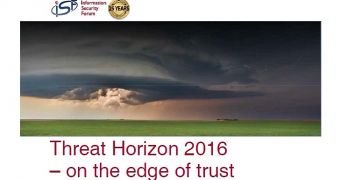The Information Security Forum (ISF) has released the Threat Horizon 2016 report, the latest in the annual series of Threat Horizon studies. The report is meant to help organizations in preparing for future cyber threats.
By knowing what to expect, organizations can take a strategic approach to managing and mitigating the risks.
“Primary analysis of data gathered for Threat Horizon 2016 resulted in an overarching theme of trust that increasingly concerns our member companies,” Steve Durbin, global vice president of ISF, said.
“Disintegration of trust will result in organizations no longer being able to take for granted that governments will look out for citizens’ best interests, that security solutions will deliver what is promised, and that their people will help navigate a way through.”
According to the report, this year, the biggest threats are cybercrime, the cyber arms race that might lead to a cyber cold war, hacktivism, and the fact that organizations focusing on privacy might be distracted from other security efforts.
In 2015, CEOs who “don’t get it,” lack of experienced workforce, outsourced security, and corporate activism fuelled by insiders are among the issues.
In 2016, the list includes state-sponsored espionage, a “Balkanized Internet” which complicates business, and the unintended consequences of state intervention.
“Threat Horizon 2014 highlighted that the cyber arms race would lead to a cold war. Rather than cold, this ‘war’ has turned hot with more governments developing offensive cyber capabilities. Threat Horizon 2015 predicted that governments and regulators will demand more of organizations in preparing for cyber threats, yet will offer little direct guidance,” Durbin added.
“In this year’s report, we have determined that government activities will further complicate the way organizations operate in cyberspace. We anticipate that the threat landscape will continue to widen and organizations must prepare to work in this new normal – now.”
The bottom line, as far as the future is concerned, is that organizations must be prepared to operate in a world in which governments put national security interests before the best interests of citizens and businesses.
Furthermore, companies need to start focusing on building resilience against cyber threats, while taking into consideration that accepted solutions are becoming less and less viable.
Chief information security officers (CISOs) need to be better prepared so that they can deliver what CEOs expect of them in terms of cyber resilience.
The complete Threat Horizon 2016 report can be purchased from the ISF Store.

 14 DAY TRIAL //
14 DAY TRIAL //